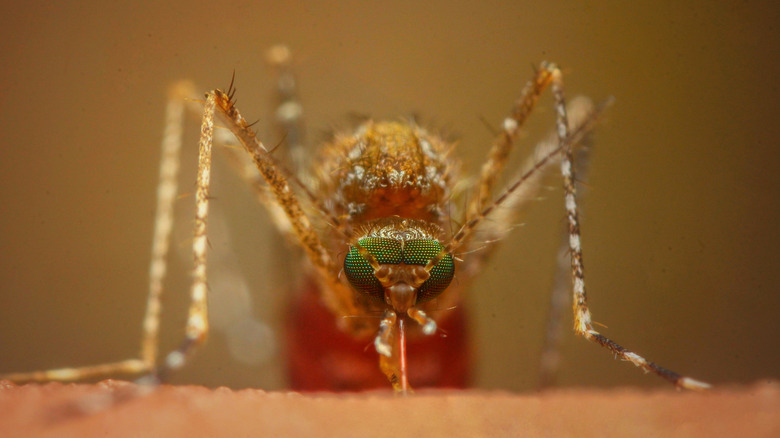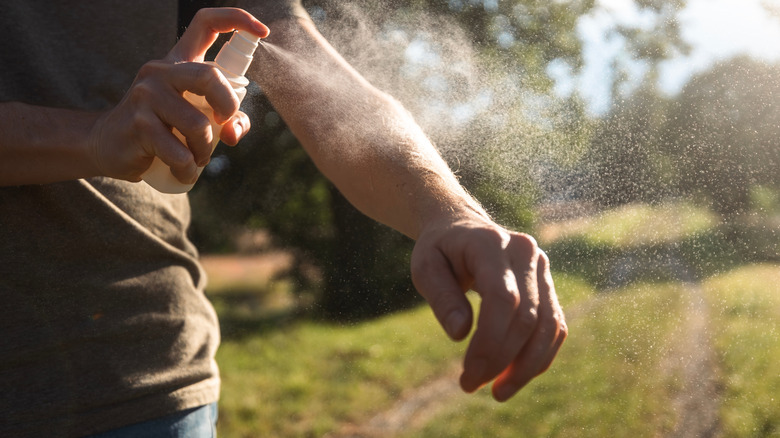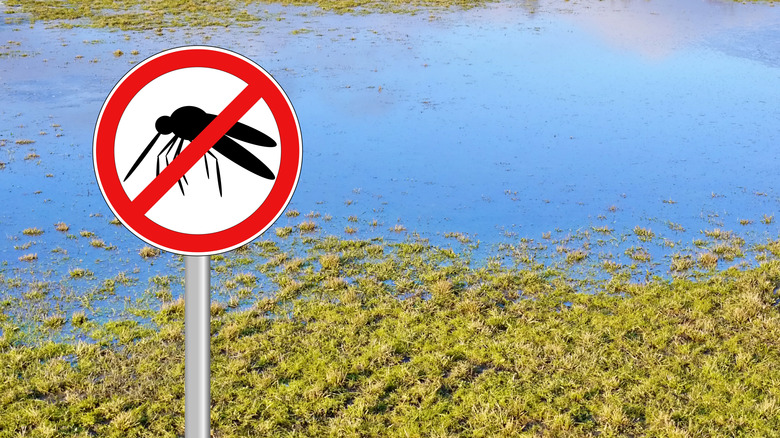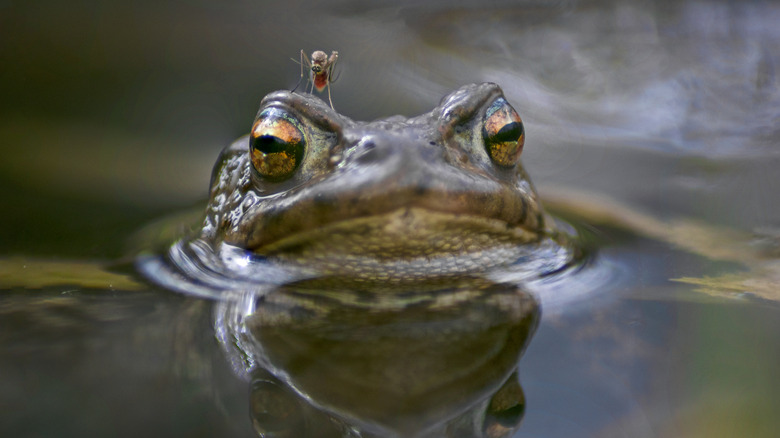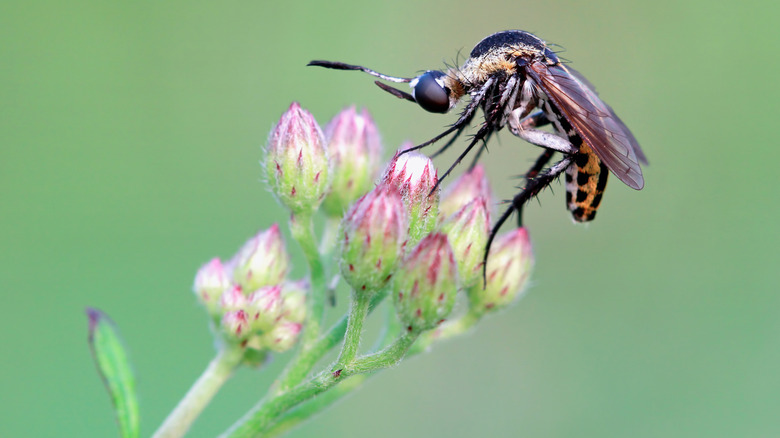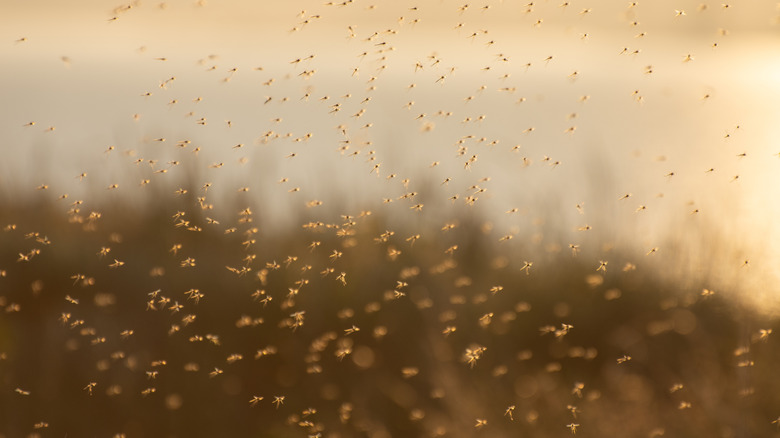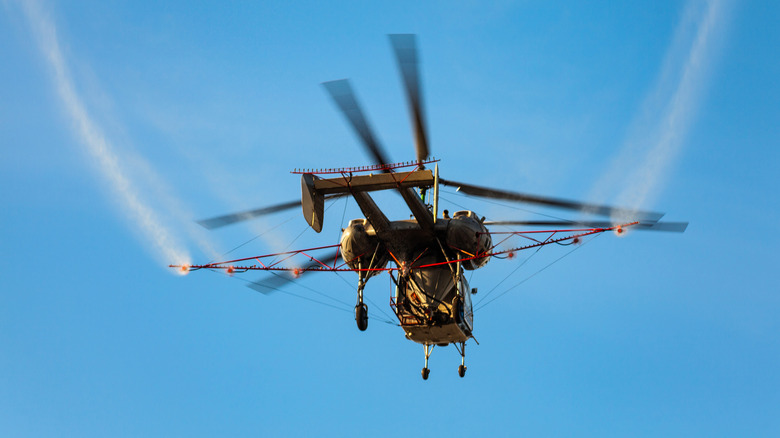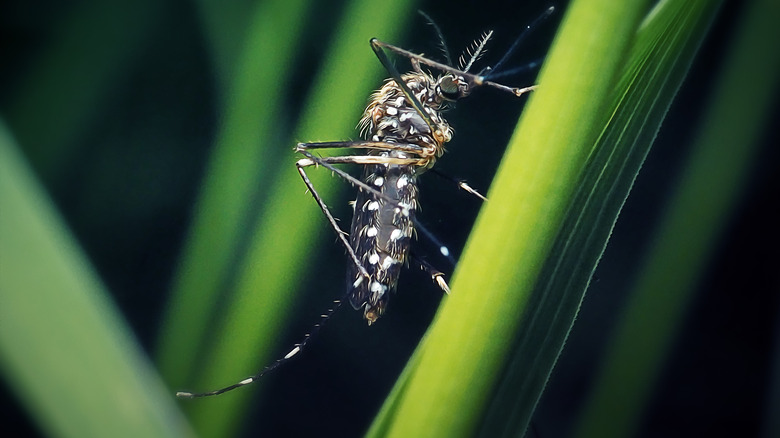What If Mosquitoes Went Extinct?
When you think of a summer barbecue, a picnic near a lake, or a walk in the woods, chances are you might associate a huge caveat with any of these common outdoor activities: mosquitoes. Humans have long battled these biting insects and unfortunately, many have died from mosquito-borne illnesses. In fact, according to data published by CBS News, mosquitoes have killed an estimated 50 billion people over the course of human history, and tens of thousands may be battling illnesses transmitted from these insects at any given time. For these reasons, it's understandable that some humans have dreamed of a world that could be completely mosquito-free.
Despite their being both nuisances and potential disease spreaders though, mosquitoes are still potentially important insects in the ecosystem. In fact, there are an astonishing 3,500+ species of mosquitoes, and most are actually not harmful to humans. Mosquitoes also live on every continent but Antarctica, and are food sources for other creatures across the globe. When it comes to possible mosquito extinction then, there are some key pros and cons to consider.
Mosquito extinction could possibly save human lives
We've all had to deal with occasional mosquito bites, but these can certain be more than just seasonal (or regional) annoyances. Certain mosquitoes transmit potentially deadly viruses to humans, including the West Nile and Zika viruses, malaria, dengue fever, and more. On a larger scale, mosquitoes have also historically been accessories during war, where humans in battle often fell ill to mosquito-borne illnesses and died. One notable example is the Revolutionary War, when a large percentage of British soldiers died of malaria transmitted by mosquitoes.
For perspective, the Centers for Disease Control and Prevention estimates there are 200 types of mosquitoes in the U.S., but only 12 types can spread diseases to humans. While only a fraction of all mosquitoes can spread deadly diseases to humans, it's hard to tell different species apart as a bystander. So in theory, not having any mosquitoes around anymore could translate to human lives saved. It's also worth noting that humans aren't the only species targeted by mosquitoes and subsequently killed by transmitted illnesses via their bites. In fact, scientists believe that a large portion of dinosaurs were also not immune to deadly mosquito-borne illnesses. This could mean that mosquito extinction might preserve the lives of other animals vulnerable to transmitted diseases, too.
Mosquitoes would no longer cause issues after floods and certain weather events
If you have ever survived water events related to hurricanes, flooding, or significant rainfall events, you know what it's like to navigate some of the dangers that can lurk in the waters that are left behind. One such danger is mosquitoes. Most of these are "nuisance mosquitoes," which aren't among the dozen or so that spread diseases to humans. True to their nickname though, these mosquitoes make up a large influx of insects after floods. Any eggs that are laid in soil during previous floods hatch shortly after these flooding events. Despite the concentration of nuisance mosquitoes after flooding, humans also still have to contend with disease-spreading mosquitoes that might increase in numbers between 2 weeks and 2 months after rainfall events. These types of mosquitoes take advantage of large bodies of stagnant water to lay their eggs in, and they are also known to quickly multiply in numbers during this time.
The extinction of mosquitoes — even the nuisance varieties — could theoretically change life immediately following events. First, if you live in an area impacted by flooding, you wouldn't have to worry about fighting off mosquitoes as you assess damages to your property. What's more, recovery workers might also get their jobs done more efficiently to help others because they won't be slowed down by pesky mosquitoes. Also, if your area is affected by large amounts of rainfall, you wouldn't have to worry about the possibility of disease-spreading mosquitoes showing up in large numbers within the days and months after water-producing events as one of the impacts of natural disasters.
A lack of mosquitoes could lead to food chain disruptions
When it comes to mosquitoes, it's difficult not to associate them with exclusively biting humans. Yet human blood is not the only source of food for mosquitoes, and the majority of them do not bite people. On the flipside, mosquitoes are on the diets of many other species. If you've ever wondered what eats mosquitoes, it turns out that these insects are key food sources for a variety of amphibians, fish, birds, and even larger insects such as dragonflies.
With all of this in mind, it's logical to hypothesize that the extinction of mosquitoes could lead to food chain disruptions. The intensity and length of the disruption is debatable, though. Mosquitoes are not the only food sources for the species that eat them, and there is certainly variability between each of these species' diets. It's still worth wondering how much of a disruption a lack of mosquitoes in the world could cause in an already-delicate food chain, though.
Mosquito extinction could mean fewer pollinating species worldwide
When you think of pollinating species, you're most likely to envision bees, butterflies, and perhaps hummingbirds. It turns out that you can count mosquitoes on this list, too. Contrary to popular belief, mosquitoes' main sources of food consist of nectar from flowers, and not blood from birds and mammals. Male mosquitoes, in particular, eat nectar exclusively. On top of this, some species of mosquitoes also play important roles in the ecosystem as pollinators, which is worth considering among the advantages and disadvantages of pollination.
Ultimately, the extinction of mosquitoes could potentially lead to even fewer pollinating species worldwide. Most plants do not solely rely on mosquitoes, though. In fact, certain types of wild orchids are believed to be the only types of plants that rely on mosquitoes for pollination. Nevertheless, the world is experiencing a loss of pollinating species more generally, so fewer pollinators overall could mean significant problems for the human food supply. In fact, an estimated 1,200 types of food crops rely on pollinators.
The ecosystem might lose harmless mosquitoes, too
If mosquitoes went extinct, most people might not feel sad about it. In fact, the idea of not being bitten by a mosquito ever again could be a welcome prospect. However, a mass mosquito extinction might ultimately include those that are harmless to humans. While there are indeed more than 3,000 species of mosquitoes, it's thought that 400 of them are disease spreaders worldwide.
Thus, focusing too much on complete mosquito eradication would mean a loss of species that are harmless to humans and still important for the ecosystem. As such, when addressing mosquito problems, it makes most sense for scientists to focus on eradicating disease-spreading insects, and not all mosquitoes in general. This way, humans could potentially be spared from deadly mosquito-borne illnesses yet still benefit from the insects for their pollinating capabilities and the other roles they play in the food chain.
Human-fueled mosquito eradication could have unintended consequences for other species
If your backyard is swarming with mosquitoes, you may have considered hiring a professional pest control company to help deal with the situation. Or, you may have thought about ways you can apply some of these methods to your property yourself. In either case, this type of mosquito control involves the use of insecticides to kill the insects. Some local agencies also use pesticides on a much larger scale to kill potential disease-causing mosquitoes. Since these types of mechanisms may help control mosquitoes, some people might wonder if broader uses of insecticides could help eradicate the insects for good.
With that in mind, it makes more sense for humans to try not to eradicate all mosquito populations entirely, but to instead focus on protecting people from the species of mosquitoes that can cause harm. Scientists are looking into a number of ways to accomplish this, but it's also important to be aware of the pros and cons of any method. The overuse of commercial insecticides can harm animal and plant life, including birds, bees, and even humans. This can lead to unintentional harm to other important species in the ecosystem. However, there are also advantages and disadvantages of biological control to consider, including those that are applied to mosquitoes. Instead, all species are more likely to benefit from a more balanced approach to mosquito control.
Without mosquitoes, new predatory insects could emerge
Despite their role in the natural food chain and ecosystem, it's understandable that some humans might wish that mosquitoes would disappear. Indeed, it's hard to resist the thought of no longer having to worry about wearing mosquito repellant with the right percentage of DEET when heading outdoors during peak season, or having to be concerned with protecting yourself against the possibility of mosquito-borne illnesses. As the saying goes though, it's important to "be careful what you wish for," and the same applies to wishing mosquitoes were no longer around. Indeed, some experts worry that mosquito extinction could pave the way for a more aggressive insect that could also possibly transmit diseases to humans.
It's difficult to imagine an insect attracted to human blood that's even more annoying than mosquitoes. But with mosquitoes out of the way, its replacement could theoretically cause painful bites. What's more, it's possible that a mosquitoes' replacement may spread new types of deadly diseases to humans. Some entomologists worry that about this super-insect scenario, and suggest there are too many unknowns to justify wanting to get rid of mosquitoes.
